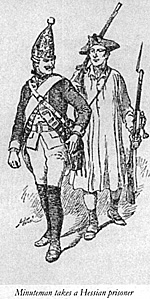
Conscription was not introduced into the UK until the 20th Century. Throughout the 'Golden' period of the British Empire, England was dependant upon a small 'volunteer' army for the protection and expansion of its sovereignty. These volunteers were supplemented by 'recruits' from the prison system. For the ordinary person joining the army was a last desperate measure to avoid starvation, debt, boredom and poverty. With this in mind, it is not surprising that the Scots and Irish were 'over-represented' within the ranks of many British Regiments.
Whilst volunteers for wars against France could always be found (although never in sufficient numbers), this was not true of the American War of Independence. Many Englishmen (including His Majesty's not-so-Loyal Opposition in Parliament) supported the cause of their rebel cousins. As a consequence there was little public support for recruitment within Britain. When it became clear that the rebels could not be subdued by political means, the Government began to look further afield for soldiers.
The first to came to the aid of England was Hanover. This state provided five battalions which were used to replace the British Garrisons of Gibraltar and Manorca; thereby freeing regular battalions for North American service. Surprisingly, England's first appeal for help was not directed to the German States but to Catherine the Great of Russia, from whom Britain requested 20,000 men. Prussia advised against accepting this offer and the British were rebuffed. If Russia had accepted then it is interesting to speculate on outcomes. If the locals were offended by the use of Germans then who knows how they would have reacted to the arrival of the Cossacks!
With the failure of their mission to Russia, the English turned to the Germany for support. Within a short period some thirty states had beaten a path to England's door with offers of troops in return for cash.
Strictly speaking, the German soldiers were not mercenaries. The bulk of their soldiers served in Regiments which otherwise formed part of their own nation's regular army. This fine distinction was ignored by the Colonists who saw the arrival of German soldiers as a sign of English perfidy. Whilst these soldiers came from half a dozen states, nearly 60% came from Hesse-Cassel.
It is probably for this reason that the German soldiers serving in North America were commonly referred to as Hessians, by both English and American authors; for convenience I will use the same term.
The arrival of the Hessians caused consternation to the rebels. It also hardened local attitudes to the Crown. Many colonists were outraged that the King should use 'foreign mercenaries' against his 'English' subjects, thereby providing ammunition to the organised minority within the Colonies who were seeking full independence from Great Britain.
[The British may have made the decision to do so on purely practical grounds but in the politically sensitive atmosphere of the American Colonies it proved to be a disastrous choice. Before the first German troops set foot in America sympathisers had already warned the American colonists of their recruitment for service. This inflamed the colonists and Thomas Jefferson added a section to the start of the Declaration of Independence listing one of King George's crimes against the colonies as..."transporting large armies of foreign mercenaries to complete the work of death, desolation, and tyranny..."– Ed.]
Of course this was not the first occasion in which German troops had been used in America. Germans served during the French Indian Wars, with General Wolfe and on other occasions as required. However, that was different; the 'enemy' now came from within and not outside the Colonies - the arrival of the "sausage-eaters" was definitely not appreciated by the majority of Colonists, even those who considered themselves loyal to the Crown.
It needs to be remembered that public and private opinions changed considerably over the course of the war. During the first year of the conflict it was common for the rebels to toast the health of King George when they sat down for their evening meal. Whilst the Prime Minister and Colonial Secretary were deeply unpopular within the Colonies a residual attachment to the Crown was maintained by many, including George Washington.
More American War of Independence
-
AWI Hessians: Historical Background
AWI Hessians: Hessian Recruitment and Performance
AWI Hessians: German Troops in America, by Unit
AWI Hessians: Wargamer Introduction
AWI Hessians: Miniatures
The French Army in the AWI
The French Army Organization and Uniforms
Battle of Lexington Scenario
-
AWI Lexington: Introduction
AWI Lexington: American Player Notes
AWI Lexington: British Player Notes
AWI Lexington: Referee Summary
Back to Table of Contents -- Kriegspieler #6
To Kriegspieler List of Issues
To MagWeb Master Magazine List
© Copyright 1999 by Kriegspieler Publications.
This article appears in MagWeb (Magazine Web) on the Internet World Wide Web.
Other military history articles and gaming articles are available at http://www.magweb.com